Reflections on ‘Extinction: The Facts’ by Sir David Attenborough
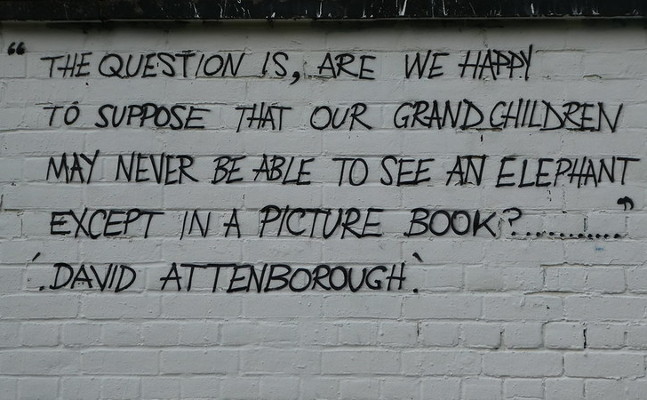
Hailed as ‘essential viewing’, ‘painful’ and ‘terrifying’ by viewers, Sophie Paterson shares her reflections on the hard-hitting BBC documentary Extinction: The Facts.
Did you tune into BBC One’s Extinction: The Facts on Sunday evening? If not, here’s a trailer clip of what you missed. You can also catch up here on BBC iPlayer.
Since airing, it has been heralded as a “harrowing warning that should be mandatory viewing for all” (Independent) and lauded far and wide by everyone from Chris Packham to Carrie Symonds. Twitter is teeming with posts and comments expressing anguish and, indeed, anger at the harsh realities presented by the nation’s most beloved naturalist. A pool of experts deliver stark statistics, interspersed with testimony from those on the front-lines of species extinction, such as James Mwenda, an award-winning member of the rhino unit team at Ol Pejeta Conservancy in central Kenya, which provides care and protection for the last two remaining northern white rhinos in existence – a mother and her daughter.
The facts presented are indeed devastating, drawing on a 2019 UN report based upon 15,000 scientific and government sources. To list just some:
- Of the estimated eight million species on Earth, a million are now threatened with extinction – 500,00 plants and animals and 500,000 insects
- Since 1970, vertebrates have declined by 60% in total
- Since 1500, 570 plant species and 700 animal species have gone extinct
- 25% of plant species assessed are threatened with extinction
Scariest of all, species extinction is now happening 100 times faster than the natural evolutionary rate and is accelerating, with devastating consequences for the entire ecosystem, ourselves included. The documentary highlights a number of key drivers behind this: the illegal wildlife trafficking trade, industrial fishing practices, growing consumption levels in developed nations which outsource polluting production practices, climate change (creating a so-called ‘escalator to extinction‘ effect for certain species) and – most significantly of all – habitat destruction in the name of monoculture agriculture (soy, palm oil, cocoa, coffee) and to house cattle for beef production. A common denominator throughout is corporate capitalism’s quest for perpetual economic growth.
Whilst none of this is likely to be new news for those already concerned with the ecological consequences of our actions – long highlighted here at Lowimpact.org – it is nevertheless a devastating indictment of the extent of the irreparable damage wreaked upon the biodiversity of our planet. The immediate question raised, then, is ‘what to do?’.
“I may not be here to see it, but if we make the right decisions at this critical moment, we can safeguard our planet’s ecosystems, its extraordinary biodiversity and all its inhabitants.”
Sir David Attenborough
It might seem far easier than not to simply turn away, to not even engage in the first place, and for this Sir David Attenborough and the team behind the documentary can be commended for achieving such wide reach and impact. Choosing to take decisive positive action when faced with seemingly such insurmountable odds, which may in turn fuel feelings of hopelessness and despair, is hard.
What happens next, says Sir David Attenborough, is up to every one of us – a statement I support, however stacked the odds may be in favour of the current status quo. Will it force meaningful change amongst politicians and corporations? I’m doubtful. As individuals, though, we can make changes. What we do know, however, is that, whilst lifestyle change is necessary, it is not sufficient. What is needed above all is a radical departure from our current economic system, the constant drive towards perpetual economic growth that is catapulting our ecosystem towards biological annihilation.
There is hope. People are building a new economy, co-operativising and democratising along the way. You can help them by purchasing from them and, where possible, working with them. We’ll soon be re-launching our sister NonCorporate.org site with even better tools and information to help as many people as possible make the switch away from the old and into the new – watch this space.
In the meantime, if you’ve got your own thoughts to share about Extinction: The Facts, I’d love to hear them.
David Attenborough’s Extinction: The Facts aired on BBC One in the UK on Sunday 13 September at 20:00 BST. Main image by duncan c via Flickr (CC BY-NC 2.0) of graffiti on a wall in Shoreditch, London.
 About the author
About the author
Sophie Paterson is a co-director at Lowimpact.org and NonCorporate.org, where she looks after promotion, social media, the blogs and more. A graduate of the School of Natural Building, she lives in Totnes, Devon, having previously spent a year living and volunteering on a nearby smallholding.
The views expressed in our blog are those of the author and not necessarily lowimpact.org's
9 Comments
-
1Anthony Hay September 16th, 2020
Sophie, I haven’t yet seen the film. From what you say it sounds powerful, but careful not to go as far as to make people feel hopless or helpless.
You say “Will it force meaningful change amongst politicians and corporations? I’m doubtful.” I’m sure you are right that people being ethical in their choices about what to buy and who they buy from is a valuable contribution to a better future that individuals can make. (Although, to be ethical in all your purchases is difficult, time consuming and possibly very limiting today, would you say?) But wouldn’t you agree that, as we are fortunate to live in a democracy, flawed though it is, the single most impactful individual action you or I could take would be to vote for a political candidate who promises to put the climate and ecological emergency at the top of the agenda? And in the mean time, if everyone who saw the film were to write to their MP asking them to support the Climate and Ecological Emergency Bill, that might also have a positive effect.
Perhaps I’m just naive?
Thanks for the post.
Anthony
-
2screecycle September 16th, 2020
I found the program upsetting for sure. But I am not upset by the situation itself, because there are no real excuses for not having previously known about and understood what is happening. What really hurts is the apathy, the expectation that it will all be fixed by someone else. Perhaps the messages need to be harder still. Why is it alarmist to tell people that their future is global conflict necessary to secure even subsistence relative to the luxury they currently enjoy. The program outlined consequences to species, sea life, agriculture without making the logical extrapolation that this means starvation, disease, death at young age for YOU the audience. Extinction, forget the rhino, the elephant they are already irrecoverably lost. It is you that the extinct is going to apply to.
Chris Packham – good guy, James Mwenda, humbled to learn of his personal actions and commitment. But seriously we need to stop pretending that people with the privilege of Carrie Symonds are helpful. There can not be a better example of lip service than Symonds. And this all adds to the myth that it’s ok to have billionaires. When 100 companies cause 90% of the damage, when 5 people dictate the news, when we imagine continual financial growth is compatible with a climate and ecological emergency. It is not and every time we fail to say so, we push the clock closer to midnight.
Finally I cannot countenance any further talk of ‘sacrifices’ we have to make to get there. The sacrifices are already made, ill health, pollution, and above all loss of freedom. We have to stop allowing people to imagine a green future as austere and dystopian, because that is exactly what business as usual means for 99% of the population.
-
3Dave Darby September 16th, 2020
Anthony – it’s just that in the world you describe, there’s no link between extreme wealth and political power, or it’s possible to sever it; and I don’t think that’s the world we live in, at all. Capitalism and (neo)liberal ‘democracy’, in the real world, with the press owned by billionaires, and with the lobby industry we have, and with superPac legislation in the US allowing unlimited, anonymous campaign donations, delivers Trump, Bolsinaro, Johnson, Modi etc, ad nauseam.
Solutions are not going to come from that direction. I used to say good luck to people who think it will, but time is running out, and I now think that it’s a waste of time. We need to build, and support the people who are building ‘new economy’ solutions.
screecycle – exactly. Don’t give up though.
-
4Daniel Scharf September 17th, 2020
Thanks Sophie, and I look forward to NonCorporate.org. However, I believe that there is readily available way of making individual actions more meaningful. Very nearly all people on the planet are members of families and most economic activities are carried out within families or households. The transition to a net zero carbon and re-wilded world will be tough. All people will be adapting to the changes and many will be agents of these changes. If families made climate and ecological emergency declarations (tell the truth, hold family assemblies and work towards net zero in personal/family emissions by 2030 and lobby/rebel for the remainder to be eliminated) family ties cross the world could amount to system change in spite of government inaction. It can start with just two family members but others will join as the facts and impacts become clearer; some in fear of missing out and others with real concern for children and grandchildren?
-
5dave September 28th, 2020
Sophie Paterson, The Universe is a harsh, peaceful and overall exiting risky place. Safe places will exist exist for a period, but a permanently peaceful, abundant planet earth is not one of them. EG: a meteorite could obliterate US ALL, as has happened in the past, remember dinosaurs ?….. Creation and Death exist in abundance from Stars to ants. Anyone craving permanent SAFETY for animals or humans needs to remember that heroes are the people that risk and lose their lives to CREATE it. And it cannot be guaranteed to last. Safety is not a given in the grand scheme of things.
-
6Dave Darby September 28th, 2020
dave – agreed, the universe is not, and will never be, a safe place for anyone long-term (we all die), and not for most animals even in the short term (most get killed and eaten before reaching adulthood).
But the main point here is whether it’s wise to increase our economic activity to the point that it destroys the ecology of our home planet. I don’t think it is.
-
7Anthony Hay October 2nd, 2020
Dave Darby – Thank you for your reply. Are you saying democracy is a waste of time? If not I’m sorry, I misunderstood. Please ignore the rest of this. Otherwise, I’d be interested to know your thoughts on some of the questions that occur to me:
Do you vote in general elections? Would advise young people not to bother voting?
Will it be any easier to get large numbers of people to change to a ‘new economy’ lifestyle than it is to persuade them to put a cross against a different candidate in an election?
Will the people who transition to a new economy lifestyle still be subject to the laws of the land?
-
8Dave Darby October 3rd, 2020
Anthony Hay – no, I’m not saying democracy is a waste of time. I think democracy would be a great thing, but we don’t have it – not even close. It would take a long time to explain this adequately, but there are lots of resources on the site, like this – https://www.lowimpact.org/lowimpact-topic/the-democracy-problem/.
My concise version: We have a money system that we use to trade – to buy and sell things. But that same money can be hoarded – i.e. can be used to become extremely wealthy. This causes 3 very big problems: 1. it sucks wealth out of communities, from the people who generate it, and concentrates it in the hands of very few people. 2. That concentrated wealth enters the political process, which corrupts democracy – so it’s not a problem that can be voted away. 3. It means that very unwise people end up in positions of extreme power, at a time when we have huge problems to solve – problems that are potentially fatal for humanity.
So the money system has to change – to one that can’t be hoarded, so that wealth isn’t concentrated. Crypto doesn’t do that, and neither do local currencies, but if you follow this blog, you’ll know that I think that mutual credit does. There’s lots of work going on in this area – again, reported regularly on this blog. But the Covid lockdowns are a huge stimulus – a moneyless trading system will be essential when money is scarce. There are lots of flavoours of muutal credit out there, some very successful. We believe that they can be joined together to form a viable global system, on which we can hang an entirely new kind of decentralised economy. It’s just a race to do it before civilisational collapse.
Do I vote? I voted Labour last time because of their support for community wealth building. If Labour had had a leader like Blair, for example, I wouldn’t have voted at all. But ultimately, I think that the political system has been captured, and in combination with corporate ownership of the media, it’s become a circus. I think that moving the focus to building a decentralised economy will move us more towards the kind of system change we need, yes. Plus, if Corbyn had been elected – very unlikely with a corporate press – he would have faced an onslaught from the corporate world, and international investors would have moved their money out of the UK, so that he would have lost the next election, if he’d even lasted a term. I don’t see how a new-economy-supporting political party could achieve or retain power. I think the political system we have is a distraction, but I wouldn’t advise people to vote in a particular way, or not to vote – it’s up to them. I tend towards anarchism. Not as scary as the corporate press paint it – https://www.lowimpact.org/my-tribute-to-david-graeber-please-read-his-words/
“Will it be any easier to get large numbers of people to change to a ‘new economy’ lifestyle than it is to persuade them to put a cross against a different candidate in an election?” – Covid will make it easier, but we have to build the institutions that make it easy for them – and they’re being built. I don’t think we have an alternative really – voting just can’t solve the problems we’re facing (although it might slow us down on the path to the cliff edge, but not much, compared to the amount of time and energy that goes into it).
“Will the people who transition to a new economy lifestyle still be subject to the laws of the land?” – yes, unfortunately, because the law will be used to try to close down the new economy. Wealth brings power, and that power will be used to keep wealth and power exactly where it is. There are many ways for communities to maintain order and prevent crime without the state. David Graeber worked in Madagascar, where the state didn’t reach most of the country, but crime was no more prevalent than in the state-controlled areas. Strong communities reduce crime, but this system is draining communities. And when it comes to murder and theft of resources, states are by far the biggest culprits.
Great questions by the way.
-
9homeminderuk October 29th, 2020
Sophie,
You invite comments: I offer mine gladly – Mr Attenborough approaches his subject [extinction] from a flawed foundation. He is not alone.
The assumption that unsubstantiated, scientifically improbable evolutionary processes have shaped life leads to many logical fallacies.
However, his status as a national treasure and purveyor of mainstream thought makes such widely publicised opinions almost impossible to counter – millions continue to be seduced by the authoritative delivery and beguling personality of a true salesman. (The educational dogma may have a tad to do with it as well.)
Observed data, collected by on-the-ground experts demonstrating what is evident today, has little bearing on origins. Until that gem is realised, the world and his wife will continue to wring their collective hands and hearts in anguish at the catastrophic collapse of the natural world.




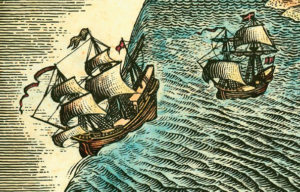 Should we not mention what’s happening to the biosphere, in case it scares the mainstream?
Should we not mention what’s happening to the biosphere, in case it scares the mainstream?
 Post-corona: ‘getting back to normal’ is not just a bad idea – it’s suicidal
Post-corona: ‘getting back to normal’ is not just a bad idea – it’s suicidal
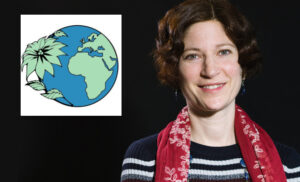 Can we avoid ecological collapse? Prof. Julia Steinberger
Can we avoid ecological collapse? Prof. Julia Steinberger
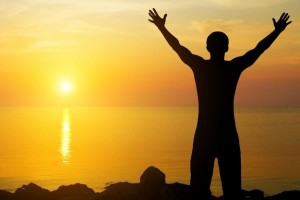 Personal development
Personal development
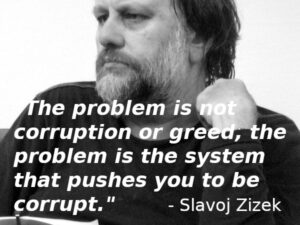 System change
System change
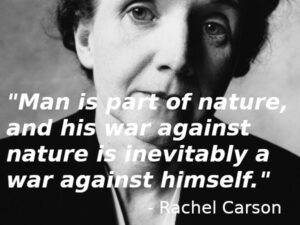 The 'nature problem'
The 'nature problem'


